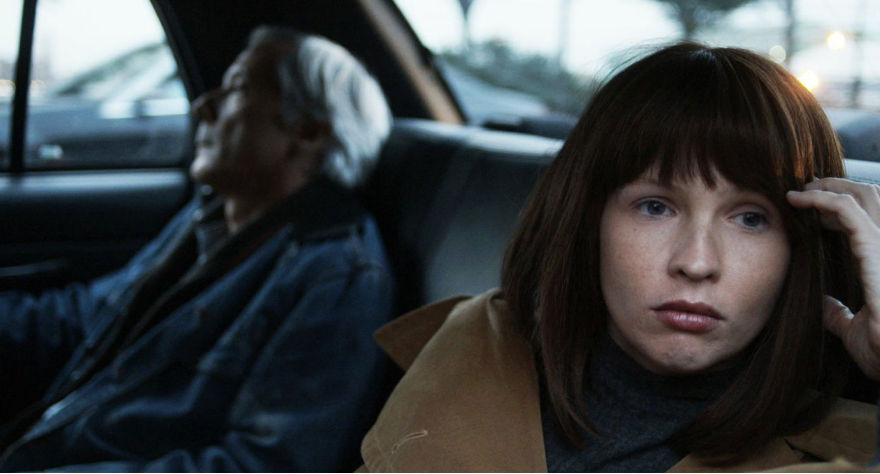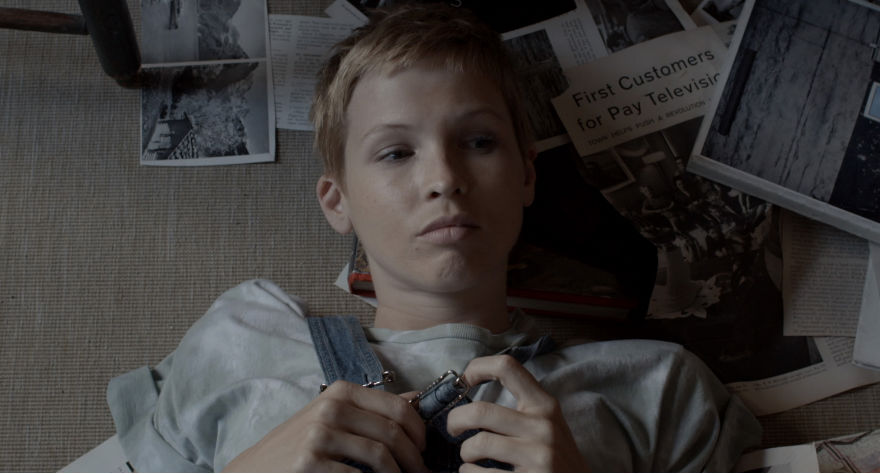Matt Creed Talks ‘Lily’, Life After Cancer

The New York-set Lily is a character portrait about a woman transitioning back into everyday life following successful cancer treatment. After struggling to survive and grappling with her mortality, Lily must now push those things out of her mind and set her sights on the future for the first time in a long time, spending time with her boyfriend, hanging out with her friends, pursuing career goals, and reconnecting with her estranged father. The film is inspired by the real life experiences of star Amy Grantham, who herself had been transitioning back into the real world following her own cancer treatment.
We spoke to Matt about how he and Amy met, how Lily is not a “cancer film”, how making the film affected Amy, capturing the aura of New York City, his approach to camerawork, and more.
Lily is available now in iTunes. For more info, visit thefilmlily.com

The film is the product of a beautiful collaboration between you and Amy. Can you talk about how you got connected?
We met through mutual friends at a coffee shop. We’d talk when we’d run into each other, and one day she told me she was sick and to check out her blog on her illness. I was really intrigued by it, and we talked about maybe doing something together. Then, she got really deep into treatment. I didn’t hear from her for a while. Towards the end of her treatment, we met up and started talking about all of these feelings and emotions she was having with her treatment coming to an end. It was really interesting, things I’d never thought about. I asked if we could write about it, and she was totally open to that.
What’s cool is that the movie isn’t about cancer.
Yeah, totally. I wanted to try to tap into what I was relating to when Amy was talking about how she was feeling about her treatment coming to an end. I realized it was her vulnerability, and if I was relating to that, I felt like a lot of people could. I thought it would be an interesting way to explore vulnerability through Amy’s story rather than just another break-up film or post-college film or something like that. But really, it’s the same concept. I’m not equating those kinds of films to having an illness, I’m equating it to having something, and then it’s gone, and what that does to someone.
You don’t see too many movies about that transition back to reality post-sickness.
It was important to tap into that moment. From the get-go, we knew we weren’t going to make a cancer film. We were going to make a post-cancer film, which was something Amy was pretty adamant about as well. It’s everything after the sickness, which is basically…life. [laughs] You’re seeing someone have life enter back into their train of thought after they haven’t really thought too much about it, because they’re just trying to survive.
It’s a hard thing to imagine for someone who’s never gone through such a hardship. Has Amy transitioned back into life completely now?
Obviously there’s tons of stuff she has to deal with, like whether or not she’ll get a vasectomy and things like that. She’s healthy–I saw her recently and she’s doing really, really well. There are no signs of cancer in her body. But there are long-term things she’s thinking about.
It’s a bizarre thought for me, to act out some the hard times of my own life onscreen.
As much as it’s based on her life, we very carefully wrote and crafted a character. The cancer parts were real, but anything else outside of that was written into the narrative. I knew pretty early on that she was going to play the part, and I didn’t want everything to be too close [to real life], so I tried to make it different as much as I could. If I did use anything from her real life, I’d tweak it so that it didn’t feel too familiar. It was pretty easy, actually. There were a few moments that were really hard for her, like going into the hospital where she got treatment in and where we shot. But other than that, it was pretty smooth.
Talk about the camerawork in the film. It’s a very expressive, vérité style.
Brett Jutkiewicz shot the film, and we talked extensively about coverage, and he brought some really great ideas. I like to have things pretty fluid; I don’t like to cut very often. Not in the sense of Béla Tarr or Tarkovsky or guys like that, but close to that. When we were going over the shots, we wanted to be very observational. Not like a documentary, but I wanted the audience to feel like a fly on the wall in her life. The camera moves in the corner from side to side during conversations, we follow her up flights of stairs from behind. We track her from behind a lot, and in the last shot we’re in front. I wanted to transplant the audience there and immerse them, as if they were there watching her get treatment, watching her walk up stairs.
I was going to mention the shot of her walking up the stairs. Not many filmmakers would take the time you do to show that.
That’s a New York shot for sure. Walk up five flights of stairs after a grueling day. I wanted people to feel tired when they got up there with her.
The sound is great in that shot as well. Was it foley or live sound?
Poor Brett…it took us ten takes to do that shot. There are a lot of tricks to it. There was a guy behind him, people going in and out of doors to kind of create that sound. The stairs are so loud. The original cut is so jarring.
What was your approach to capturing the atmosphere and vibe of NYC on screen?
For me, it was just showing the New York that I know and see, which is very intimate. Walking by the bubble guy, you stop and get this breath of fresh air for a moment. People are yelling in the street, then you keep going. That’s the New York that I’d known for 12 years, and it was about showing those mundane, every-day moments. People that really know New York kind of fall in love with that part of it. I wanted it to be in the background and not so abrasive, like, “New York! This is it!” I wanted it to be subtle and in the background, like an afterthought. It’s there, and whatever happens happens.
I liked Amy’s interactions with Simon, who plays her boyfriend. He’s great.
He’s never acted in his life. My producer tricked him into auditioning. We were doing auditions, and he read the script and really liked it. He came by to meet us but didn’t know he was auditioning. The first time he did it I didn’t run the camera on him, and he was great. I had him come back the next day and I was able to shoot him, and he was so natural. I auditioned a bunch of other men, and they just didn’t get it.
What didn’t they get?
They were just trying to play it pretty sleazy, you know? The older guy with the younger girl. Everyone was really sleazy. I was trying to tell them to listen to her, but they wouldn’t. Simon came, and I told him to listen to her story and react, and he did. It was very earnest and natural. It was a challenge for him, and he loved it. He nailed it.
From what I understand, you don’t enjoy the auditioning process.
I hate it.
Why?
I don’t know. I think it’s just…I don’t want to put my foot in my mouth. It’s awkward for me. I’m probably more nervous than them!
What was Amy’s physical condition during the shoot. Was she getting through it okay?
There were some moments where she was tired. At one point she actually got sick with the flu. I think it’s because her immune system was still coming back. Towards the end there was one point where she had a 100 degree fever. Other than that, she was a trooper. It didn’t affect her. She was pretty healthy.
Did the movie have a positive affect on Amy, maybe in a cathartic way?
I think she was just happy to have done something she’d never done before, something she really wanted to do in her life. I hope she does more of it, because she’s really talented. I think she was excited. I think it was a good thing for her, to go from being sick to making this movie.
